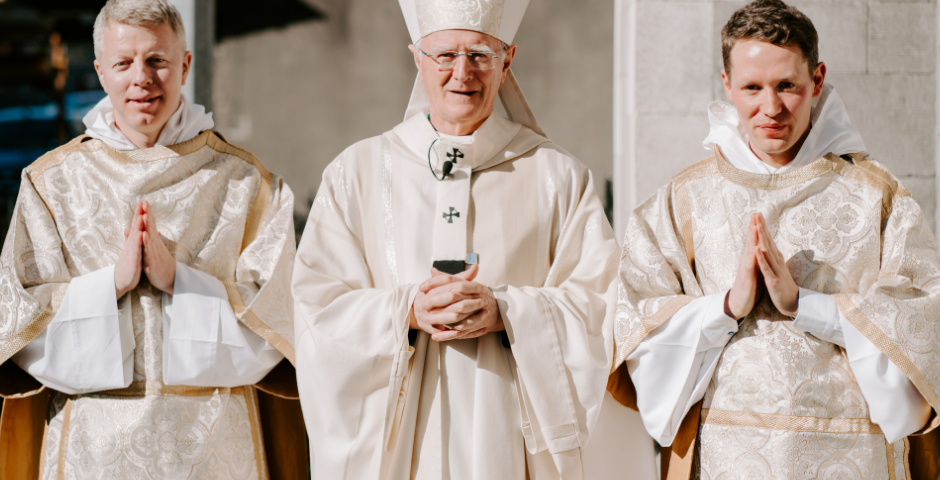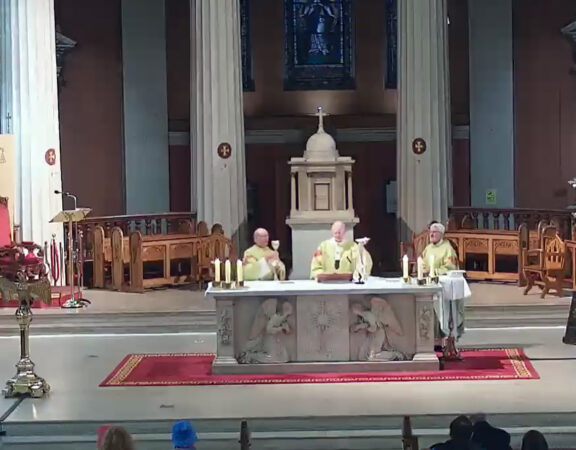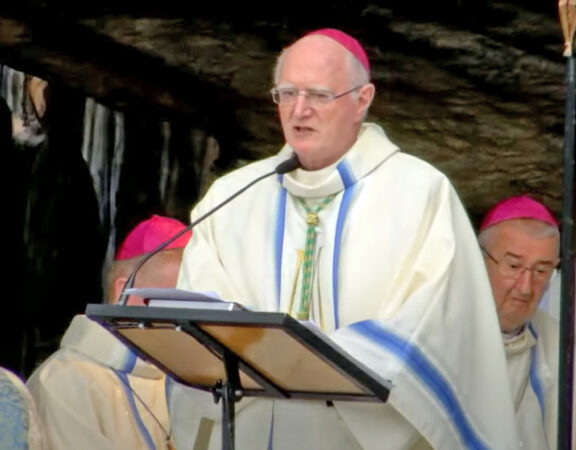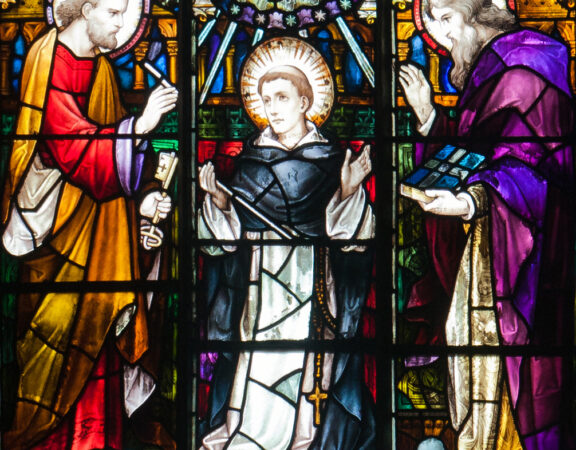Homily of Archbishop Dermot Farrell for the Diaconate Ordination of
Anthony Kavanagh O.P and Kellan Scott O.P
Dominican Priory, Dominic Street,
5thMarch 2022
It is a great joy for me to be here today to ordain Anthony Kavanagh and Kellan Scott to the Diaconate.
Everyone knows the Dominicans as the Order of Preachers. Your core charism is the proclamation of the Good News of God (see Mark 1:14), the gospel of God which took flesh and dwelt among us in Christ Jesus, and which by the power of the Holy Spirit, Lord and Giver of Life, is brought to life in generation after generation in the community of believers, in the Church.
A number of years ago, your esteemed confrère Liam Walsh put it like this:
Christians live by faith.
They live by faith in the Gospel of God that is embodied in Christ Jesus
and given life in the believer by the Holy Spirit.
And he went on to develop it as follows,
The call to believe in the gospel comes in words (see Rom 10:6–18).
The reception in faith of the reality expressed in those words is a profound,
all-encompassing commitment of self to God.
And yet it too is expressed in words, as the proclamation was done in words.”
(Liam G. Walsh OP, “The Creeds in Scripture and in the Liturgy” in Boland and McCarthy (eds), The Word is Flesh and Blood: the Eucharist and Sacred Scripture (Dublin: Dominican Publications, 2012), 97–109, at 97.)
We preach in words. And we preach the gospel of Jesus Christ, not an idea or a concept, but good news, born in the gift of God, and born in our encounter with Him in prayer. We do not preach some word or ideology of our own. Today, I will entrust you, Anthony and Kellan, with the Book of the Gospels with these words: “Receive the Gospel of Christ, whose herald you have become.” We do not preach in our own name, but in the name of the Church which is the privileged place of the Word’s dwelling. St Paul puts it, “I do not live, but Christ lives in me” (Gal 2:20). Reading the life of St Dominic, and the other great Dominican saints, it is clear that the mystical was an essential part of their religious life. Their mysticism would not have been possible unless they were personally passionate about the Lord Jesus and the gospel.
In the end Thomas Aquinas, not only an outstanding medieval theologian, but one of the great theological minds of all time, abandoned his great theological work, not because he had no more to say, but because the mystery he had experienced in contemplation was utterly beyond the reach of all human words, all human constructs. In his own wonderful phrase “all that I have written seems like straw to me.” The mystical can bring the learned to silence, and this silence of the mystics is the soil for their humble and simple words in speaking of God.
There is a profound joy at the heart of Dominican spirituality. The foundations of that joy are fraternity, prayer and study. As Herbert McCabe—another worthy confrère—reminds us, “it is God who prays. Not God who answers prayers but God who prays in us in the first place. In prayer, we become the locus of the dialogue between the Father and the Son” (God Matters, p 221). Clearly we cannot make this come about. It has to be a grace offered and accepted
Aquinas—as to be expected of his time—was first and last a teacher of Sacred Scripture. But what he taught was not just what he had come to understand from the Fathers or from Aristotle whom he read and interpreted afresh. It was also what he had come to hear unfolding in his own heart. We too are not just handing on that which we have learned, but what we have discovered in our hearts. The proclamation of the gospel demands that we use both our ears—as it were—the ear of the heart to hear the Word of God, and the ear of that same heart to hear ourselves and ourselves in the Church and in the world.
Our prayer cannot be an escape from the harsh world. Paying true attention to our neighbour is unthinkable without prayer or being present to God. Surely the tragic and cynical invasion of events in Ukraine these last days bring this home. “The essential act of prayer is to stand unprotected before God. Why should we be reluctant to do this? God loves us, and we generally like conversing with people who like us” (Sr. Wendy Beckett on Prayer). Preaching presupposes that we are talking to God, and seeking his word—within and without. As your Dominican tradition rightly underlines, preaching is always regarded as a spiritual activity, even a contemplative one.
Down through the centuries, in difficult times, members of the Order preached the Good News of the gospel. The vocation of Dominicans has been shaped by the demands of history and of the world of the day. The call is to live life in response to the needs of others and to the demands of the gospel at any given moment.
Like Jesus, we are called to be open to the reality in which we find ourselves. That reality is the sacrament of the mystery of God among us and within us. This is our Catholic way. There is no situation from which God is absent. We cannot avoid reality and hope to proclaim the living word of the living God. People need us to be people “of courage, ready to draw near to those in pain and lend a helping hand” in the words of Pope Francis, “contemplatives, whose closeness to people enables them to proclaim before the wounds of our world the power of the Resurrection at work even now” (Congress on Vocations, 17 February 2022, emphasis added). Our prayer, like our lives, cannot lose contact with human need. Here “humility in listening must correspond to courage in speaking” (Vademecum for the Synod on Synodality, par 2.3). In the words of today’s Ordination Rite: “Believe what you read, teach what you believe, and practice what you teach.” These words are at the core of your ministry as a deacon.
But let us return to Thomas for a moment: one phrase derived from the Summa Theologia has by now almost become a ‘motto’: Contemplata aliis tradere” which translates as “to give to others the fruits of contemplation.” (Summa Theologiae, III, Q. 40, A. 1, Ad 2). While the Word was spoken once and for all in Christ Jesus, we cannot cling to a transient past. Rather we must open ourselves to the innovative and life-giving action of the Holy Spirit, the Spirit who raised Jesus from the dead, and who is always present in the Church and in human history, and who opens new doors, as others are closed. That word that was spoken in Christ needs to come alive for our contemporaries. The challenge for the homilist is to weave together the two strands—the things God gives us in silence, in the hidden place, as St Matthew calls it in the Gospel of Ash Wednesday, the contemplata, and the things God gives us in the world, in creation—in all its drama and wonder, and in its tragedies and tensions. More and more, through the ministry of the deacons, the Church renders itself present to the world of need and pain, a world that all too often remains hidden from our eyes.
We have not been abandoned by our God; God’s will can be found in the situation in which we find ourselves right now with reduced numbers in ministry and in religious life. Like Christ, we must enter into God’s silence in the face of the epochal change confronting the Church, in the face of migrants perishing in the Mediterranean, and in those killed in Ukraine or forced to flee their homes and their homeland. We remember that Calvary and the empty tomb are of the same rock; as Christians we remember that the Cross and the Resurrection are the one word of the living God.
Rather than looking back with de-energising nostalgia to the Church of our youth, let us look ahead to the Church in which we will minister and worship. In the end, the Gospels, rooted as they are in the story of Jesus of Nazareth, are even more the story of the Risen Lord among his disciples. They root us in our beginnings, but more importantly provide a vision of the road Christ calls us to take. Like Christ himself, their words are truly human, truly of this world; they are true words, and more: they are words of Truth. Like the Risen Lord, who inspired them, they call us not only to assent to them, but to trust in them, to believe in their good news (see Liam Walsh above). They are entrusted to us, and now to you, Anthony and Kellan—in all our weakness and unworthiness—to proclaim them, to unfold them, to embody them, and most of all to be nourished by them (see Dei Verbum §21). I therefore join with your own families, with your Dominican confrères, and the broader Dominican family in warmly congratulating you. May your parents, your family, and all who have been involved in your formation, see the fruits of the ways in which they have contributed to making you the people that you are, ready to go forward. May the Lord who has begun this good work among us and in you bring it to completion.
St Dominic, pray for us.
St Catherine of Siena, pray for us.
END









